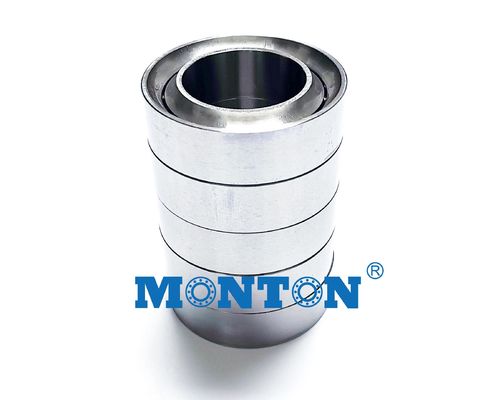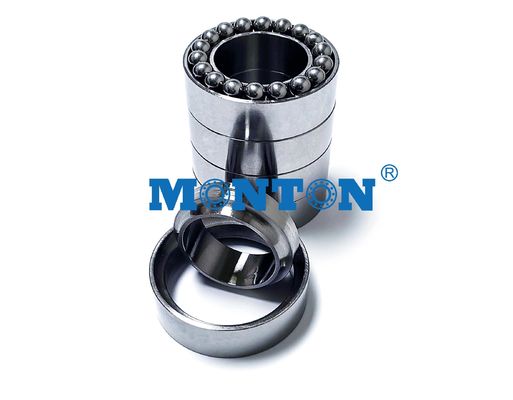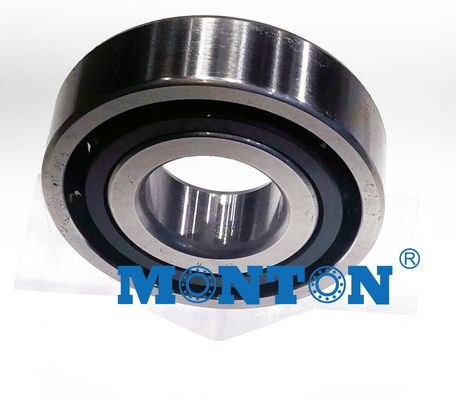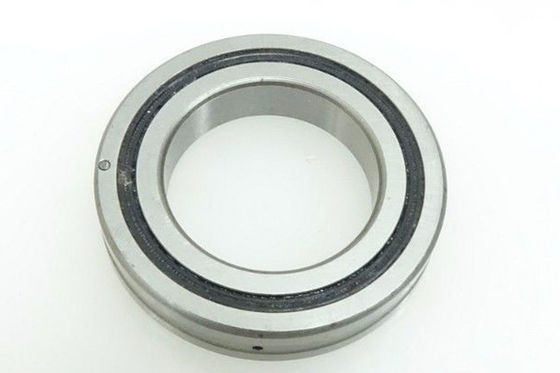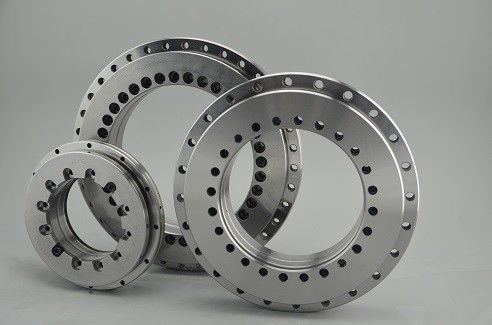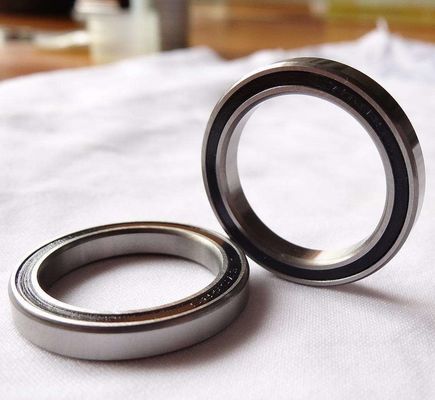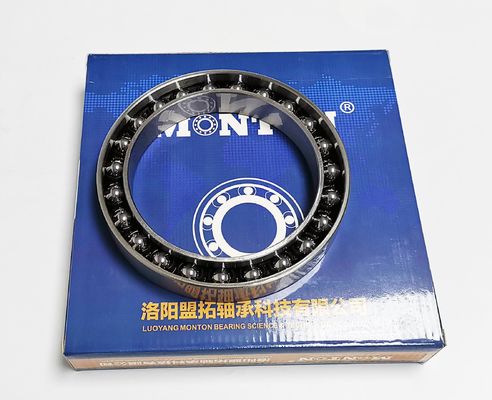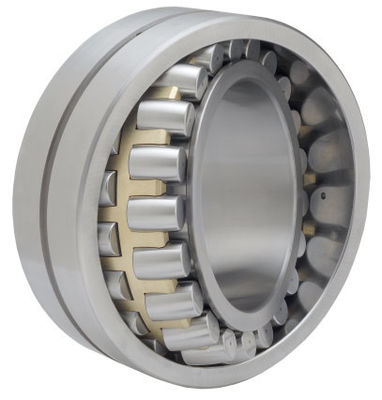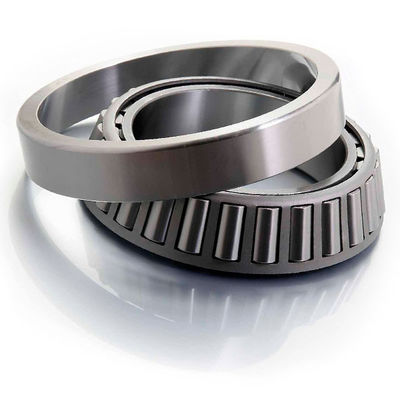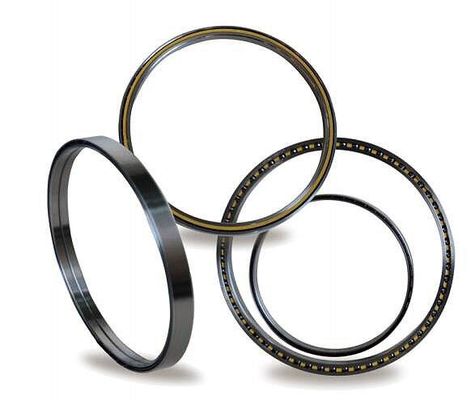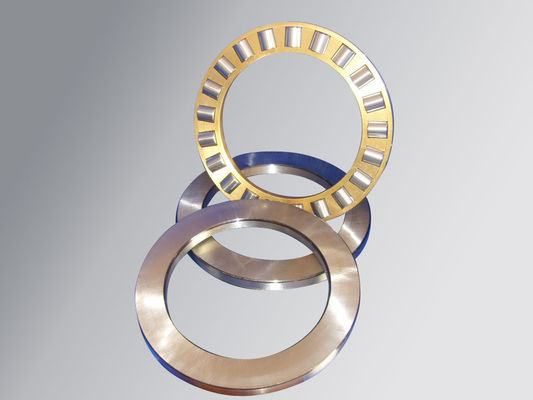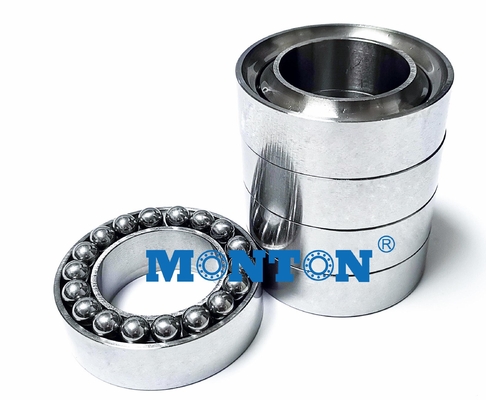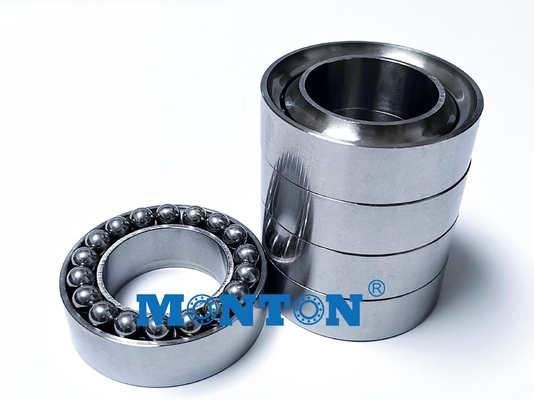Our main bearings products including bearings of petroleum screw drilling tools, equal-wall-thickness rubber stator of petroleum screw drilling tools, roller bearings(bearing roll),55SiMoVa or 8620 steel ball of three-roller rock bit, roller, thrust block and pad as well as hobbing cutter shaft of coal mine development, and main and supporting components and parts of construction machinery. The bearings for petroleum screw drilling tools(multi-row thrust ball bearings)are our leading products developed and filled the gap of China in 1980s.Up to now, there are more than 20 series including over 200 models.
Whether you’re drilling for oil or gas, the bearings in a mud motor at the end of a drill string have a direct impact on productivity and reliability. These mud motor bearings have to endure extreme
operating conditions. In addition to severe axial and shock loads, these bearings are “lubricated” with highly abrasive mud, which for a bearing is the definition of an extreme operating condition.

Down hole motor or drilling motor for the oil drilling industry
Bearing Assembly of Downhole Motor is used to transmit motor rotary dynamic force to the bit, meanwhile to withstand axial and radial load from drilling weight. Inside of the Bearing Assembly,Monton uses TC Radial Bearing and a stacked thrust bearings. The thrust bearings support the downward force resulting from the “weight on bit” (WOB) and the loads from the combination of hydraulic thrust and weight loads from internal components.Monton provides different bearing assemblies, designed to meet the diverse requirements of the drilling industry.

Mud Motor Radial Bearing
A mud motor bearing assembly, comprising: a stationary housing having an inner wall surface defining an interior bore; a rotatable drive shaft extending through the interior bore of the stationary housing, the rotatable drive shaft having a tubular drive shaft with a uniform outer diameter terminating at an outlet section with an enlarged outer diameter, the rotatable drive shaft including an inner bore for passage of a drilling fluid; a bearing section bearing a radial load and an axial load, the bearing section including at least a pair of stationary bearing rings and at least a pair of rotating bearing rings in stacked arrangement, each of the stationary bearing rings having an inner periphery and an outer periphery, the outer periphery of each of the stationary bearing rings operatively engaged to the inner wall of the stationary housing, the inner periphery of each of the stationary bearing rings including a projection, each of the rotating bearing rings having an inner periphery and an outer periphery, the inner periphery of each of the rotating bearing rings operatively engaged to the tubular drive shaft, the outer periphery of each of the rotating bearing rings including a projection, the projections of the pair of stationary bearing rings forming a recess that accommodates the projection of one of the pair of rotating bearing rings in sliding engagement; wherein the stacked arrangement alternates between at least partially overlapping stationary bearing rings and rotating bearing rings.
Mud motor bearings
Mud motor bearings, or ball bearings have conventionally been used to react thrust, or axial, loads in down hole mud motors. When low rpm power sections are used in the application such bearings provide sufficient life and reliability. However, bearing component fatigue causes life to decrease linearly as speed increases. This fatigue makes ball bearings unsuitable for high rpm motors. Standard engineering practice dictates that ball bearings are specified according to L10 life, or the number of revolutions a group of identical bearings is expected to sustain before 10% fail. As revolutions are related to speed, bearings operating in a higher speed motor will fail before those operating in a low speed motor, e.g. one could roughly expect a 90% reduction in bearing life if speed was increased from 100 to 1000 rpm. In addition to life, friction and horsepower losses are often of interest in drilling. Ball bearings are referred to as frictionless bearings due to the rolling nature of the elements, however in practice frictional losses exist due to rolling resistance and sliding. An order of magnitude approximation of the coefficient of friction (cof) for an angular contact bearing operating in ideal non-abrasive lubricant conditions is 0.0032.1 In drilling mud, the cof can be assumed to be significantly higher.

Bearing Assembly
The function of the bearing assembly in a positive displacement drilling motor is to support axial load (typically weight on bit) and centralize and support side loading on the motor’s driveshaft. The bearing assemblies used in drill motors have been developed for use in different applications with certain motor configurations offering a choice of axial bearing type options. All MONTON bearings are fluid-lubricated and optimized for specific drilling applications.
Ball Bearing The Ultra Ball Bearing assembly has been improved over the years and suits for the majority of drilling applications. These bearings are used on various power sections where moderate weight on bit and drilling torque are required. With the introduction of high power Ultra drilling motors with an increased torque output, the ball bearings have been continuously improved to handle it.
The ball bearing assembly is the bearing of choice for many applications as modern PDC bit designs demand higher torque, available from today’s drill power sections. This bearing assembly is suited to more demanding applications using low or medium speed motors, where the objective is to increase drilling performance by driving more torque to the bit.
The 6 ¾ in. extreme™ ball bearing assemblies have been developed to maximize performance and reliability in challenging drilling environments and are reserved for exclusive use with the extreme motors. Also featuring an increased internal diameter, this bearing type allows for a step-change in torque capacity of the motor driveshaft-necessary assuring reliable delivery of the massive torque generated by the extreme power section.

Bearing Sub-assembly
The bearing sub assembly transmits the torque and speed of the rotor, as well as the compressive load from the bottom hole assembly (BHA). The primary components of the bearing assembly are the driveshaft, bearing housing, radial bearings, and axial bearings.
The axial bearings are a stacked ball-and-race design that provides durable performance down hole while maintaining ease of repair. The bearing assembly is also a mud-lubricated design in which the drilling fluid provides lubrication to both the radial and axial bearings while drilling. An advantage of mud lubrication is that there are minimal limitations on bit pressure drop compared to sealed bearing assembly. The bit pressure drop can be maximized for optimum penetration rate without adversely affecting the life of the bearing subassembly. Also, because mud-lubricated bearing subs assemblies do not contain any elastomeric seals, they can be run in the highest down-hole temperatures and in highly aromatic drilling fluids without fear of degradation. The bearing housings are available with a threaded outside diameter for screw-on stabilizers for tool sizes with an outside diameter greater than 5”. This option allows the stabilizers to be changed in the field.

Monton offers two bearing assembly options: M1 and M2.
M1 Bearing Subassembly
The first generation, mud-lubricated bearing subassembly is a field-proven design that has been deployed in most drilling applications. The M1 is ideally suited to be run with Flex Drill power sections.
M2 Bearing Assembly
The G2 (second-generation) performance bearing subassembly that is designed for today’s harsher drilling environments. With improved radial and axial bearing design, the M2 sub assembly can handle the higher torque associated with of either HR or Siro Star power sections. Its improved radial bearings provide increased durability in high dogleg applications. A short bit-to-bend M2 bearing subassembly is available in limited sizes.
Bearing Section
The bearing section makes up the lower half of the motor. It is comprised of a drive shaft that is supported by a series of radial and thrust bearings. The bearing section is what controls the mechanical energy supplied by the power section to the drive shaft. The drive shaft transfers
this energy to the drill bit through the bit box. Drilling parameters, such as weight on bit (WOB), circulation rate, and bit differential pressure directly affect the bearing section.
The Monton bearing section is an open bearing design (i.e. the bearings are lubricated by the drilling fluid). Monton uses a stacked multiple ball-and-race design for the thrust bearings (see Figure 5). An open bearing system offers
the advantage of allowing higher differential pressures across the drill bit over a traditional sealed bearing arrangement.
The thrust bearings support the downward force resulting from the weight on the drill bit (WOB)
and the loads from the combined hydrostatic thrust and weight from the internal motor
components. Radial bearings support the side loads on the drive shaft and help regulate the flow of drilling fluid through the bearing assembly. Some of the drilling fluid is diverted to cool and lubricate the bearings. Monton uses radial bearings with tungsten carbide tile inserts which are
imbedded in a tungsten carbide matrix for maximum wear resistance from side loads.

About the redesign process
Specially designed to provide excellent radial load support for both sealed and mud motors, Monton tungsten carbide radial bearings are made using a unique microwave sintering process (resulting in 1 600 Vickers hardness) as compared to typical conventional sintering (with 1 000 Vickers hardness). This results in a high hardness of 92 HRa for excellent wear resistance and longer life.
To significantly improve bearing performance and reliability,Monton engineers used proprietary Monton design and simulation tools to:
• accurately define the behavior of a bearing stack
• redesign the bearing to minimize stresses and optimise load carrying capacity
• test new designs and materials. With the Monton virtual test rig, engineers were able to identify and correct the problem of cracked rings and sheared balls – two common problems with these bearing
Downhole sealing solutions
Monton has innovative seal designs and quality materials for downhole rotating seals exposed to high pressure. The Monton Teflathene seal incorporates a low-friction PTFE seal ring bonded to a rubber body. The all-rubber DM2 seal separates drifting mud from lubricants in oil-lubricated mud motor bearings. Bottom hole assembly (BHA) tools such as shocks and jars require seals to protect the tool hydraulics from the abrasive drill muds and cuttings in the hole. Measure-while-drilling (MWD) tools sometimes require high-temperature sealing solutions.Monton has developed a full line of field-proven seals to work in this demanding environment, including a seal capable of withstanding up to 315 °C (600 °F).
How the new bearing works
The typical mud motor bearing contains between 8 and 12 rows for design optimization. When the bearing is new, the majority of the load is accommodated by the first four or five rows . As
each row starts to wear, the load is shifted to the next row and the next until all the rows are worn equally. Then, the load is shifted back to the first row and the process is repeated.
This unique design enables the bearing to last significantly longer than previous bearing designs.
Product features
• Special steel for all bearing components
• Full complement bearing
• Precision matched rings
• Unique bearing design to support heavy axial drilling loads
Customer benefits
• Improved wear-resistance
• Increased load carrying capacity
• Optimized load distribution
• Increased robustness
• Improved reliability
• Customized design
Application:
Oil drilling motor
Down-hole motor
Electric submersible pump
Bearing working life:
300hours
Main Customers:
Oil company like: SLB, Halliburton and GE
Main application:
Downhole motor or drilling motor

 Your message must be between 20-3,000 characters!
Your message must be between 20-3,000 characters! Please check your E-mail!
Please check your E-mail!  Your message must be between 20-3,000 characters!
Your message must be between 20-3,000 characters! Please check your E-mail!
Please check your E-mail! 
